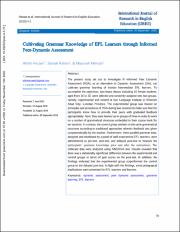| dc.contributor.author | Rezaee, Afshin | en_US |
| dc.contributor.author | Rahimi, Siamak | en_US |
| dc.contributor.author | Mehrabi, Masomeh | en_US |
| dc.date.accessioned | 1399-08-23T12:00:35Z | fa_IR |
| dc.date.accessioned | 2020-11-13T12:00:35Z | |
| dc.date.available | 1399-08-23T12:00:35Z | fa_IR |
| dc.date.available | 2020-11-13T12:00:35Z | |
| dc.date.issued | 2019-09-01 | en_US |
| dc.date.issued | 1398-06-10 | fa_IR |
| dc.identifier.citation | Rezaee, Afshin, Rahimi, Siamak, Mehrabi, Masomeh. (2019). Cultivating Grammar Knowledge of EFL Learners through Informed Peer-Dynamic Assessment. International Journal of Research in English Education, 4(3), 70-83. doi: 10.29252/ijree.4.3.70 | en_US |
| dc.identifier.issn | 2538-4015 | |
| dc.identifier.issn | 2538-3027 | |
| dc.identifier.uri | https://dx.doi.org/10.29252/ijree.4.3.70 | |
| dc.identifier.uri | http://ijreeonline.com/article-1-226-en.html | |
| dc.identifier.uri | https://iranjournals.nlai.ir/handle/123456789/607906 | |
| dc.description.abstract | The present study set out to investigate if informed Peer Dynamic Assessment (P-DA), as an alternative to Dynamic Assessment (DA), can cultivate grammar learning of Iranian intermediate EFL learners. To accomplish the objectives, two intact classes including 15 female students, aged from 16 to 20, were selected and randomly assigned into two groups, namely, experimental and control at Iran Language Institute in Khorram Abad City, Lorestan Province. The experimental group was trained on principles and procedures of P-DA during two sessions to make sure that the participants know how to provide their peers with graduated feedback appropriately. Next, they were teamed up in groups of three in order to work on a number of grammatical structures embedded in their course book for ten sessions. In contrast, the control group worked on the same grammatical structures according to traditional approaches wherein feedback was given unsystematically by the teacher. Furthermore, three parallel grammar tests, designed and developed by a panel of well-experienced EFL teachers, were administered as pre-test, post-test, and delayed post-test to measure the participants’ grammar knowledge prior and after the instructions. The collected data were analyzed using ANCOVA test. Results revealed that there was a statistically significant difference between the experimental and control groups in terms of gain scores on the post-test. In addition, the findings indicated that the experimental group outperformed the control group on the delayed post-test. In light with the findings, some pedagogical implications were presented for EFL teachers and learners.
| en_US |
| dc.format.extent | 614 | |
| dc.format.mimetype | application/pdf | |
| dc.language | English | |
| dc.language.iso | en_US | |
| dc.relation.ispartof | International Journal of Research in English Education | en_US |
| dc.relation.isversionof | https://dx.doi.org/10.29252/ijree.4.3.70 | |
| dc.subject | Dynamic assessment | en_US |
| dc.subject | Informed Peer-dynamic assessment | en_US |
| dc.subject | Grammar learning | en_US |
| dc.subject | EFL learners | en_US |
| dc.subject | Special | en_US |
| dc.title | Cultivating Grammar Knowledge of EFL Learners through Informed Peer-Dynamic Assessment | en_US |
| dc.type | Text | en_US |
| dc.type | Research | en_US |
| dc.contributor.department | Language Department, Ayatollah Borujerdi University, Iran | en_US |
| dc.contributor.department | Language Department, Ayatollah Borujerdi University, Iran | en_US |
| dc.contributor.department | Language Department, Ayatollah Borujerdi University, Iran | en_US |
| dc.citation.volume | 4 | |
| dc.citation.issue | 3 | |
| dc.citation.spage | 70 | |
| dc.citation.epage | 83 | |





